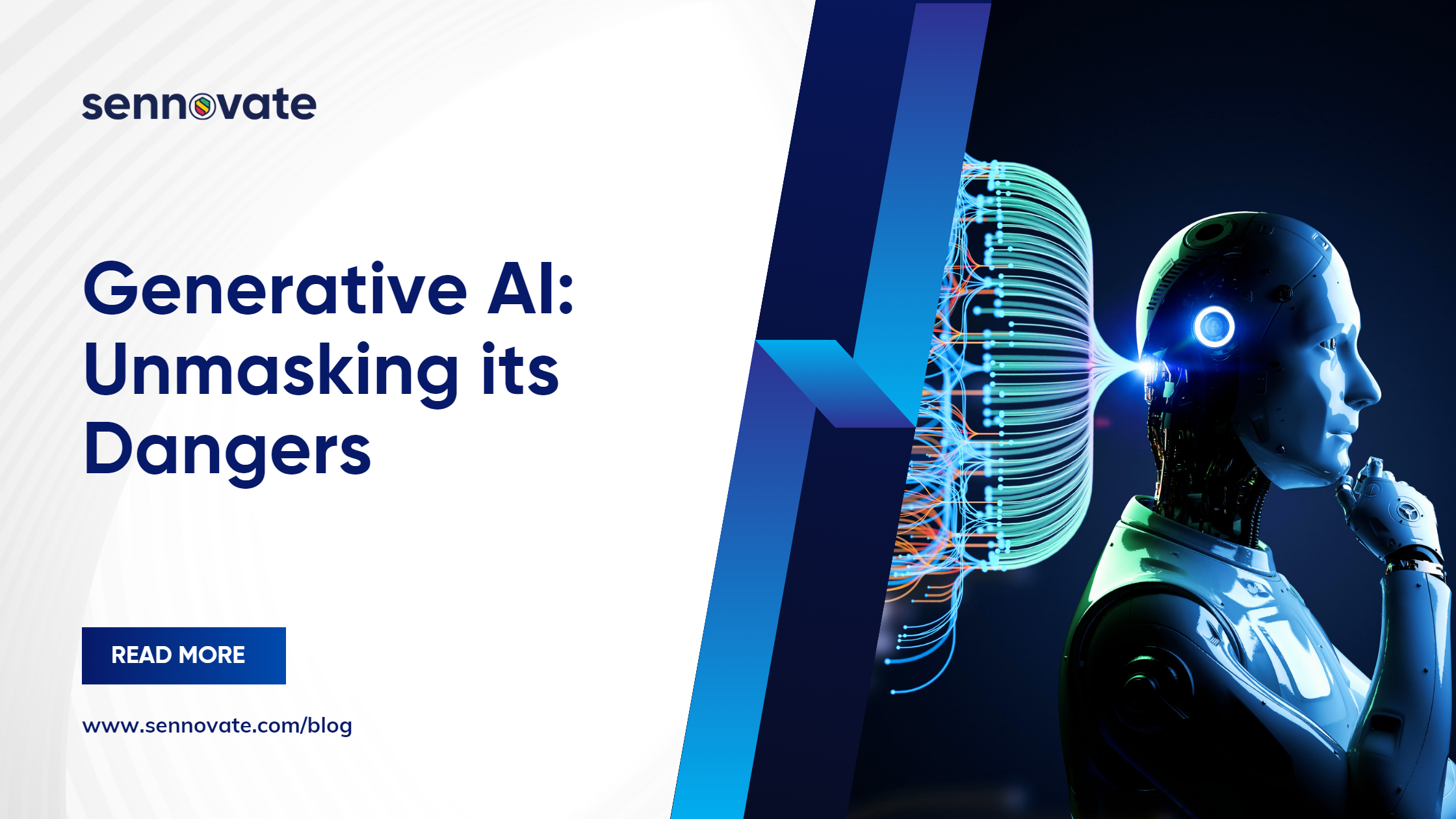

Generative AI: Unmasking its Dangers
“The danger of generative AI is that it lacks the ability to understand misinformation”
Introduction
Generative AI, a rapidly evolving field of artificial intelligence (AI), has garnered significant attention for its ability to generate new and creative content. With extensive training on vast datasets, generative AI models can produce text, images, music, and videos that closely resemble human creativity. One prominent example of it is Chat GPT, which showcases the remarkable capabilities of this technology. However, along with its promises, it also poses certain risks, especially when in the wrong hands. This blog aims to delve into the potential dangers associated with generative AI, exploring issues such as misinformation and manipulation, privacy and security concerns, amplification of bias and discrimination, intellectual property infringement, and unintended consequences. By understanding these risks, we can better address them and foster responsible use of the AI technology.
What is Generative AI really capable of?
Generative AI has the potential to revolutionize various industries, enhance creativity, and facilitate innovation. However, it also possesses certain dangers that must be acknowledged and mitigated. Here are some of the key risks associated with it:
Misinformation and Manipulation:
One of the significant concerns surrounding generative AI is its potential to generate highly convincing fake content, including deepfakes. These manipulated videos and images can make it appear as though individuals are saying or doing things they never did, leading to the spread of misinformation, deception, and manipulation. Such malicious use of it can undermine trust in media, cause harm to individuals and society, and pose serious challenges for identifying genuine information.
Privacy and Security Concerns:
Generative AI in the wrong hands can be exploited to create synthetic images, videos, or audio that infringe upon privacy. For instance, it can be utilized for identity theft, generating fake profiles, or even bypassing security measures. This raises significant concerns regarding personal privacy, security breaches, and the potential for malicious activities such as blackmail or fraud. Safeguarding against these risks is essential to ensure the responsible use of generative AI technology.
Amplification of Bias and Discrimination:
Generative AI models trained on biased datasets can inadvertently amplify existing societal biases, resulting in the generation of content that reinforces stereotypes and discrimination. If not carefully managed, generative AI can perpetuate harmful biases in areas such as hiring practices, public policy recommendations, and the portrayal of certain groups. To prevent the reinforcement of discriminatory patterns, it is crucial to address bias during the training and development of generative AI models.
Intellectual Property Infringement:
Generative AI can generate content that closely resembles copyrighted material, potentially infringing upon intellectual property rights. This raises legal and ethical questions concerning ownership, creative originality, and fair use of the generated content. Striking a balance between creative expression and intellectual property protection becomes crucial as generative AI continues to advance.
Unintended Consequences and Ethical Concerns:
The deployment of generative AI systems can lead to unintended consequences or ethical dilemmas. The sheer volume of generated content can overwhelm human reviewers, making it challenging to identify problematic or malicious outputs. Additionally, the potential for misuse or unintended harm raises important ethical considerations that must be addressed to ensure responsible development and deployment of generative AI technology.
What can be done to combat these threats?
To address the risks associated with generative AI and safeguard against its dangers, several measures can be taken:
Robust Safeguards and Guidelines
Developing robust safeguards, responsible guidelines, and regulatory frameworks is essential to detect and counteract fake or harmful content generated by AI. Collaboration between AI researchers, industry experts, policymakers, and ethicists can help establish comprehensive guidelines and best practices.
Technological Advancements
Continued technological advancements are necessary to enhance the detection and mitigation of generated content that can cause harm or spread misinformation. Improving AI models’ ability to identify deepfakes and synthetic content is crucial to stay ahead of evolving malicious techniques.
Security Education and Awareness
Raising awareness about the potential pitfalls of generative AI and providing security education to users can empower them to identify and critically evaluate synthesized content. Educating the public about the risks and responsible use can minimize its negative impacts and foster a more informed society.
Conclusion
Generative AI presents immense opportunities for creativity and innovation, but it also carries inherent risks. Misinformation and manipulation, privacy and security concerns, amplification of bias and discrimination, intellectual property infringement, and unintended consequences are among the significant dangers associated with it. By acknowledging these risks and taking proactive measures, such as developing robust safeguards, promoting responsible guidelines, and advancing technological capabilities, we can navigate the complexities of AI and ensure its ethical and responsible use. Striking the right balance between innovation and protecting societal well-being is key as generative AI continues to shape the future of artificial intelligence.
Having any doubts or want to have a call with us to know more about cyber security solutions?
Contact us right now by clicking here, Sennovate’s Experts will explain everything on call in detail.
You can also write a mail to us at [email protected] or call us on +1 (925) 918-6618.
About Sennovate
Sennovate delivers Managed Security Operations Center (SOC) solutions, custom Identity and Access Management (IAM) solutions and Social Engineering Defence (SED) services to businesses around the world. With global partners and a library of 2000+ integrations, 10M+ identities managed, we implement world-class cybersecurity solutions that sa ve your company time and money. We offer a seamless experience with integration across all cloud applications, and a single price for product, implementation, and support. Have questions? The consultation is always free. Email [email protected] or call us at: +1 (925) 918-6618.



